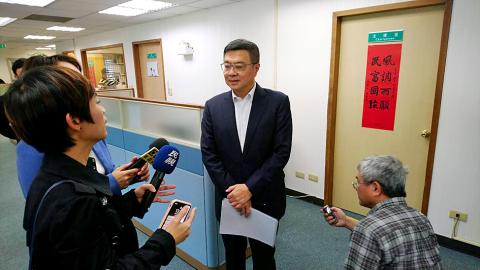Leading Democratic Progressive Party (DPP) members yesterday defended the Central Epidemic Command Center’s (CECC) decision to overturn the Mainland Affairs Council’s (MAC) announcement allowing the entry of Chinese children of Taiwanese and Chinese couples into Taiwan, and praised the Executive Yuan’s quick response.
Officials said that the move could have placed too much burden on already-strained domestic resources in the fight against COVID-19.
DPP Chairman Cho Jung-tai (卓榮泰) lauded the government’s quick response after MAC’s announcement on Tuesday drew a predominantly negative response.

Photo: Chen Yu-fu, Taipei Times
The Executive Yuan was quick in reading the pulse of public opinion, and put a temporary stop to that policy to reflect the will of Taiwanese, Cho told reporters at party headquarters in Taipei.
The council was acting in keeping with policies that are being implemented when it made the announcement on Tuesday. he said.
“However, it is clear that in light of the epidemic, the public believes that the government must prioritize protection of its citizens, and that their welfare must come first,” he added.
Asked if the MAC and other ministries have been rash in making decisions, Cho said that careful assessment and prudent examination are vital in the decisionmaking process.
“It is important that to safeguard Taiwan, government officials must be more flexible and sensitive to the needs and will of the public,” he said.
DPP Legislator Cheng Yun-peng (鄭運鵬) said that Taiwan had in recent years had many interactions with China.
It is not just the MAC, but legislators across parties have received many appeals and requests for assistance, including family problems, he said.
“I can understand that as school is about to reopen, the MAC and other officials have come under a lot of pressure, with appeals and requests for help for students going to school, along with personal and family situations,” he added.
Asked about the policy reversal, Cheng said: “This showed that the decision and its implications were not carefully assessed.”
However, “I am sure that [MAC officials] will be more prudent the next time,” Cheng added.
DPP Legislator Wang Ting-yu (王定宇) said that MAC officials made a “foolish” announcement on Tuesday.
“Right now, most Taiwanese are very worried about the ‘Wuhan virus’ and they are distrustful of the Chinese government,” Wang said. “As such, people were riled up and criticized MAC officials. I see this reaction as a very good thing for Taiwan, as it sends a strong signal of their discontent about the decision.”
“It was a rather foolish decision, and when it was announced I had already told them that the decision should be postponed,” he said.
“With Taiwan still combating the ‘Wuhan virus’ outbreak, which has strained our healthcare resources, and with the MAC failing to come up with a clear explanation, Minister of Health and Welfare Chen Shih-chung (陳時中), the head of the CECC, had to put a stop to the MAC’s policy,” Wang added.

A small number of Taiwanese this year lost their citizenship rights after traveling in China and obtaining a one-time Chinese passport to cross the border into Russia, a source said today. The people signed up through Chinese travel agencies for tours of neighboring Russia with companies claiming they could obtain Russian visas and fast-track border clearance, the source said on condition of anonymity. The travelers were actually issued one-time-use Chinese passports, they said. Taiwanese are prohibited from holding a Chinese passport or household registration. If found to have a Chinese ID, they may lose their resident status under Article 9-1

Taiwanese were praised for their composure after a video filmed by Taiwanese tourists capturing the moment a magnitude 7.5 earthquake struck Japan’s Aomori Prefecture went viral on social media. The video shows a hotel room shaking violently amid Monday’s quake, with objects falling to the ground. Two Taiwanese began filming with their mobile phones, while two others held the sides of a TV to prevent it from falling. When the shaking stopped, the pair calmly took down the TV and laid it flat on a tatami mat, the video shows. The video also captured the group talking about the safety of their companions bathing

PROBLEMATIC APP: Citing more than 1,000 fraud cases, the government is taking the app down for a year, but opposition voices are calling it censorship Chinese Nationalist Party (KMT) Chairwoman Cheng Li-wun (鄭麗文) yesterday decried a government plan to suspend access to Chinese social media platform Xiaohongshu (小紅書) for one year as censorship, while the Presidential Office backed the plan. The Ministry of the Interior on Thursday cited security risks and accusations that the Instagram-like app, known as Rednote in English, had figured in more than 1,700 fraud cases since last year. The company, which has about 3 million users in Taiwan, has not yet responded to requests for comment. “Many people online are already asking ‘How to climb over the firewall to access Xiaohongshu,’” Cheng posted on

A classified Pentagon-produced, multiyear assessment — the Overmatch brief — highlighted unreported Chinese capabilities to destroy US military assets and identified US supply chain choke points, painting a disturbing picture of waning US military might, a New York Times editorial published on Monday said. US Secretary of Defense Pete Hegseth’s comments in November last year that “we lose every time” in Pentagon-conducted war games pitting the US against China further highlighted the uncertainty about the US’ capability to intervene in the event of a Chinese invasion of Taiwan. “It shows the Pentagon’s overreliance on expensive, vulnerable weapons as adversaries field cheap, technologically